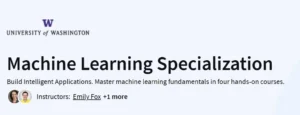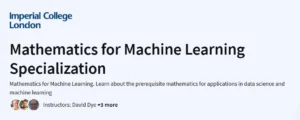What will you learn in this Bayesian Statistics Specialization Course
Bayesian Foundations: Grasp the core principles of Bayesian statistics, including probability theory, Bayes’ theorem, and the philosophical differences between Bayesian and frequentist approaches.
Advanced Modeling Techniques: Delve into complex models such as mixture models and dynamic linear models, enhancing your ability to model real-world data scenarios.
Markov Chain Monte Carlo (MCMC): Learn computational techniques like MCMC to perform Bayesian inference when analytical solutions are intractable.
Time Series Analysis: Apply Bayesian methods to time-dependent data, enabling forecasting and understanding of temporal patterns.
Practical Application with R: Gain hands-on experience using R programming for Bayesian data analysis, reinforcing theoretical knowledge through practical exercises.
Program Overview
1. Bayesian Statistics: From Concept to Data Analysis
⏳ 11 hours
Introduction to Bayesian thinking and probability.
Comparison between Bayesian and frequentist methods.
Basic data analysis using R
2. Bayesian Statistics: Techniques and Models
⏳ 29 hours
Exploration of advanced models and computational techniques.
Implementation of MCMC methods using R and JAGS.
Application to various data types including continuous, binary, and count data.
3. Bayesian Statistics: Mixture Models
⏳ 21 hours
Understanding and applying mixture models.
Techniques for model fitting and assessment.
Use of R for practical implementation.
4. Bayesian Statistics: Time Series Analysis
⏳ 22 hours
Modeling temporal dependencies in data.
Forecasting using dynamic linear models.
Hands-on projects with real-world time series data.
5. Bayesian Statistics: Capstone Project
⏳ 12 hours
Integration of knowledge from previous courses.
Comprehensive data analysis project using Bayesian methods.
Presentation of findings in a professional report format.
Get certificate
Job Outlook
The demand for professionals skilled in Bayesian statistics is growing across industries such as finance, healthcare, and technology.
Proficiency in Bayesian methods enhances roles in data science, machine learning, and statistical analysis.
Employers value the ability to handle uncertainty and make probabilistic inferences, skills central to Bayesian analysis.
Specification: Bayesian Statistics Specialization
|
FAQs
- Basic statistics and probability knowledge is recommended.
- No deep prior experience in Bayesian methods is required.
- The course builds foundational concepts step by step.
- Programming familiarity (Python/R) helps for hands-on exercises.
- Suitable for beginners in Bayesian approaches with statistical background.
- Bayesian statistics incorporates prior knowledge or beliefs into analysis.
- Frequentist methods rely only on observed data.
- Bayesian results are probabilistic, providing uncertainty estimates.
- Useful for decision-making under uncertainty.
- Offers flexibility in modeling complex real-world scenarios.
- Healthcare and clinical trials for treatment effect modeling.
- Finance for risk assessment and forecasting.
- Marketing for predicting customer behavior.
- Tech companies for A/B testing and recommendation systems.
- Research roles requiring probabilistic inference.
- Includes hands-on exercises with real datasets.
- Teaches model building and evaluation in Python/R.
- Covers interpreting probabilistic results for decision-making.
- Introduces hierarchical models and Bayesian networks.
- Prepares learners for applying Bayesian analysis in business and research contexts.
- Basic Python or R programming is necessary.
- Focus on libraries like PyMC3, Stan, or JAGS.
- Emphasis is on implementing models rather than advanced software development.
- Step-by-step guidance is provided in exercises.
- Learners can practice with provided templates and examples.





